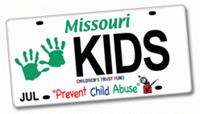Missouri uses CBCAP federal funding to support projects that bring together multiple community providers to more effectively and efficiently address the complex issues that face at-risk families. These collaborative efforts not only work to improve outcomes for families, they also serve to reduce duplication and maximize the capacity of already existing services.”
Origin/History
Community Based Child Abuse Prevention (CBCAP) is a federal funding initiative that originates from the Administration for Children and Families, Department of Health and Human Services, Washington, D.C. Its intent is to support state efforts to help communities create and operate networks of community-based, prevention-focused family resource and support programs. Originating from Title II of the Child Abuse Prevention and Treatment Act (CAPTA) Amendments of 1996, the legislation recognizes that individual child abuse and neglect prevention programs cannot stand alone.
The Missouri Model
The Children’s Trust Fund (CTF) is the designated agency by the Governor to disburse CBCAP funding in Missouri. CTF provides grants that help agencies work together to provide a coordinated network of family support services in communities which strengthen families and reduce the incidence of child abuse and neglect. The Missouri model works to:
- Incorporate a designated lead agency to facilitate the provider network to provide a seamless coordination and delivery of prevention and family support services to more efficiently serve families and their children
- Reduce the duplication of existing services;
- Maximize the often strained resources of public and private providers to better serve children and families;
- Reduce the likelihood of child abuse and neglect from occurring.
Evaluation/Outcomes
As part of the requirements, each community site must participate in a rigorous strategic planning and evaluation process including specific data collection. Missouri is recognized by the federal funding agency as attaining the highest level of program standards and performance indicated by evidenced based outcomes and successful replication of the program in other communities. CBCAP community sites continue to show statistically significant improvement in scores of standardized measures of family risk (Child Abuse Potential Inventory) and distress (Parent Stress Index) among parents participating. Families also report high levels of satisfaction with the services they receive. An additional outcome includes communities successfully leveraging other funds, thereby increasing their capacity to better serve families. Each step along the way best practices, lessons learned and promising approaches are identified, shared and incorporated into the next generation of communities.
View or download report – Social Cost Savings and Impact of the CBCAP Missouri Model in Preventing Child Abuse/Neglect
Listen to CBCAP Learning Call/Webinar – FRIENDS National Resource Center
The CBCAP Missouri Model- Better Collaboration, Outcomes, and Prevention of Child Maltreatment – September 2012
Unique Features
CBCAP focuses on primary prevention (entire population) and secondary prevention (populations at greater risk) to prevent child abuse and neglect from ever happening in the first place. CBCAP features include:
- No stigma – participants self-identify their strengths and needs;
- No barriers – all families who seek support can participate;
- Provides services to families who might otherwise “fall through the cracks” such as parents with mild cognitive disabilities, subjects of “unsubstantiated reports” who want supportive help, geographically or socially isolated families, homeless parents, migrant families, families of children with disabilities;
- Family-focused – agencies involve families in program design, implementation, and evaluation, which bestows dignity on consumers and leads to increased program effectiveness;
- Agencies connect with new partners, network services and referrals, thus avoiding wasteful duplication;
- Strong early-outreach component, solving problems before crises erupt;
- Increases availability of prevention services in rural areas;
- Programs become part of a larger network, strengthening and supporting one another, and creating a more effective, user-friendly, seamless system of family support services;
- Collaboration at all levels – public, private, state, local including parents in leadership roles.
Current CBCAP Grant Recipients — Home Visiting Grants
####




